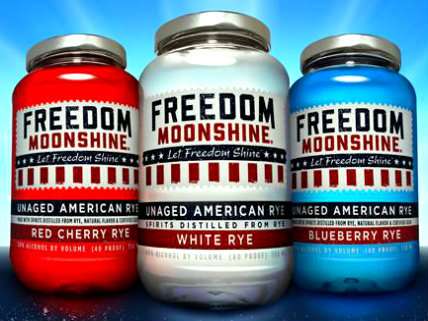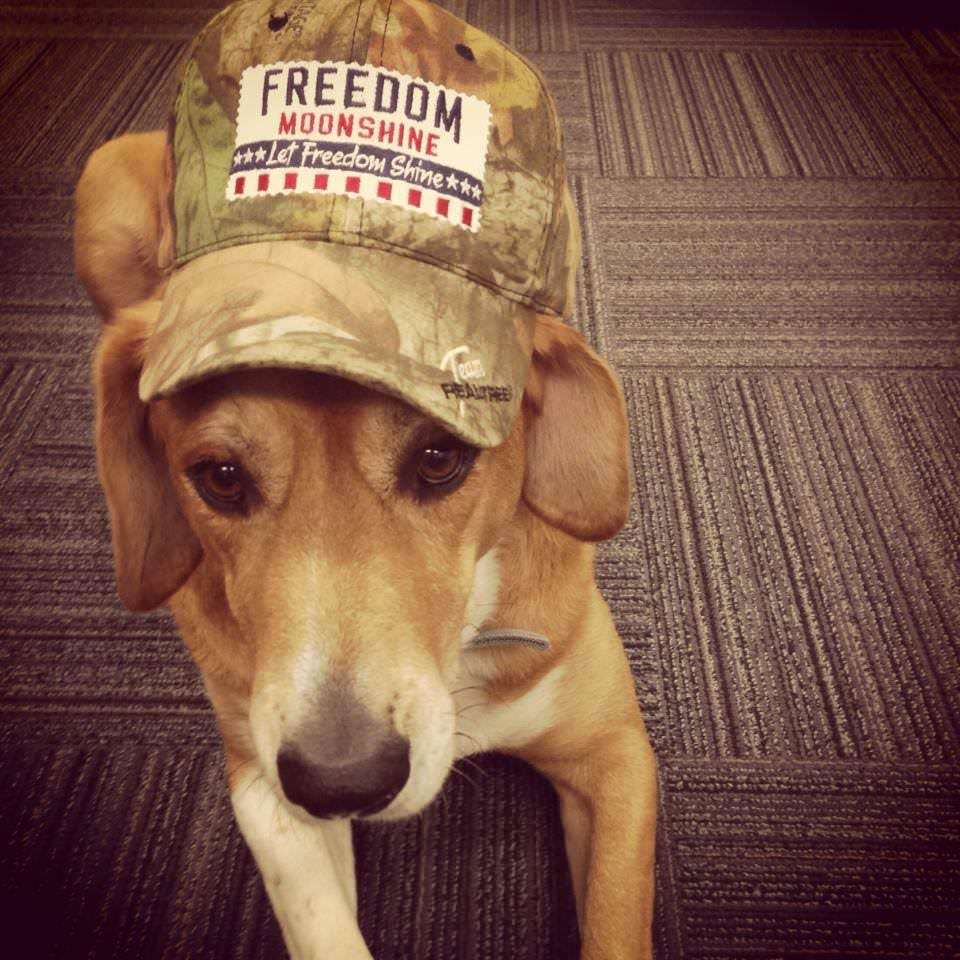Get Drunk the Liberty-Loving Way With 'Freedom Moonshine'

Want to get drunk and celebrate liberty at the same time? Introducing Freedom Moonshine. Three varieties of the unaged rye whiskey—red cherry, white rye, and blueberry—will hit the market in May.
Made by Chattanooga Whiskey* founders Tim Piersant and Joe Ledbetter, Freedom Moonshine is aiming to compete with Gatlinburg, Tennessee-based Ole Smokey Moonshine, according to the Chattanooga Times Free Press., which also details the state of the "legal moonshine" industry.
Existing entrants into the fast-growing legal moonshine market have grown sales by distributing through Walmart and other mainstream retailers, rather than purely through liquor stores. Such mainstream acceptance of a drink that for decades has remained off limits to law-abiding citizens has caught the attention of larger distillers such as Jim Beam, which in 2013 released Jacob's Ghost, its own version of the unaged rye whiskey.
The term moonshine is now used to describe any high-proof distilled spirits, though it once connoted illegal status (the Merriam-Webster definition of moonshine is "a kind of alcohol that people make illegally"). Moonshine made by licensed distillers following relevant state whiskey protocols is now legal; moonshine made in your kitchen or mine or is not.

I used to make moonshine in my kitchen, or at least help my then-boyfriend make it after he grew bored with homebrewing. We had a tiny, lovely copper still from Portugal. I proudly posted pictures of the process online until a friend warned me to stop if I didn't want to get arrested.
I'd had no idea we were breaking the law—we had just legally brewed beer in our hallway. We weren't selling the moonshine we made. But under federal law, even making spirits for your own consumption is illegal. "Only with the right permits may a person make ethanol," NPR notes.
Folks selling stills and other distilling supplies told NPR that sales have been up recently. But much like head shops must pretend to be selling products "for tobacco use only," places selling distilling equipment must pretend customers are making perfumes or perhaps herbal tisanes, not rye and grappa and vodka. They're also prevented from giving customers distilling advice.
Some states do permit home moonshining, though their laws are in conflict with federal laws. In Missouri, adults of legal drinking age can make up to 100 gallons per year for personal use without a permit. In 2009, many counties in Tennessee opened up to the production of "legal moonshine."
But in most places, home distilling remains illegal, and it is prosecuted. Last week, 200 gallons of moonshine were seized in Alabama. An article from North Carolina's Indy Week says state agencies there prosecuted 76 illicit liquor cases in 2011 and 2012, collecting $41,507. (For more on the war on moonshine, see this 2010 segment from Reason TV.) I look forward to trying some of Chattanooga Whiskey's Freedom Moonshine—the flavors are intriguing, and I like its marketing and packaging. But under antiquated federal alcohol laws, real "freedom moonshine" is the kind you make in your backyard/garage/kitchen. I may have to break out my still again soon…
** Though Freedom Moonshine comes from the founders of Chattanooga Whiskey, it is not a Chattanooga Whiskey product. Brand manager Ashley Danford described it as collaboration between the distillery Tennessee Stillhouse and sales agency TMIC.


Show Comments (58)